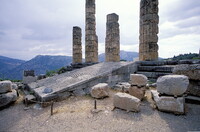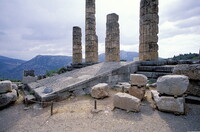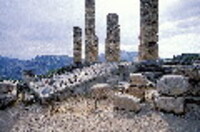| dc.coverage.spatial | Site: Delphi, Central Greece and Euboea, Greece | en_US |
| dc.coverage.temporal | ca. 510 BCE (creation) | en_US |
| dc.creator | unknown (Greek (ancient)) | en_US |
| dc.date | -510 | en_US |
| dc.date.accessioned | 2013-05-22T19:12:17Z | |
| dc.date.available | 2013-05-22T19:12:17Z | |
| dc.date.issued | -510 | en_US |
| dc.identifier | 220604 | en_US |
| dc.identifier.other | archrefid: 683 | en_US |
| dc.identifier.uri | http://hdl.handle.net/1721.3/128528 | |
| dc.description | The entry ramp; In 548 BCE the Archaic Temple of Apollo was destroyed by fire, and the Amphiktyonic League, which administered the sanctuary, reorganized it completely, doubling its area and demolishing any monuments, including the two Sikyonian buildings, that obstructed the new plan. The League then constructed a new Temple of Apollo (ca. 510 BCE) on a terrace retained on its south side by an impressive wall of curvilinear polygonal masonry. The temple was Doric and made largely of poros, though its east façade was built of Parian marble at the expense of exiled Athenian aristocrats, the Alkmaionids. One of the largest temples of its period (59.5 x 23.8 m), it had an elongated plan (6 by 15 columns) to incorporate the altar of Hestia (thymele), 'the common hearth for all Hellas' (Plutarch: Aristides XX.iv), and the adyton with the pit from which the oracular vapour ( pneuma) emanated, beneath the tripod and beside the Pythian laurel tree. Source: Grove Art Online; http://www.groveart.com/ (accessed 12/9/2007) | en_US |
| dc.format.medium | stone; marble | en_US |
| dc.rights | © Scott Gilchrist, Archivision, Inc. | en_US |
| dc.subject | architectural exteriors | en_US |
| dc.subject | deities | en_US |
| dc.subject | mythology (Classical) | en_US |
| dc.subject | Classical | en_US |
| dc.title | Delphi: Temple of Apollo | en_US |
| dc.title.alternative | Temple of Apollo | en_US |
| dc.type | image | en_US |
| dc.rights.access | Licensed for educational and research use by the MIT community only | en_US |
| dc.identifier.vendorcode | 1A3-G-D-5-D5 | en_US |
| vra.culturalContext | Greek (ancient) | en_US |
| vra.technique | construction (assembling) | en_US |
| vra.worktype | temple | en_US |
| dc.contributor.display | unknown (Greek (ancient)) | en_US |


